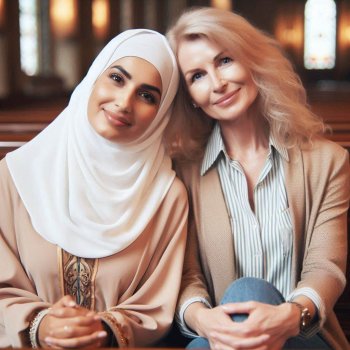Now, it’s my turn to offer an scenario for you to think about ::)
One group of Muslim mature women of Arab descent who dress according to the hijab code convert to Christianism in Louisville. They start attending a Christian church where you are the pastor. They tell you they have dressed hijab all their lives and feel like “naked” if they don’t wear it in public. Furthermore, they confess they feel somewhat uncomfortable seeing that some young Christian women attend wearing skirts that look too short or cleavages too deep. At the same time, some sisters who have attended your church for years approach you and let you know they feel “weird” sitting next to them as “they don't look like Christians”. What would you do?
View attachment 46500
I live roughly 30 miles south of Louisville. I go there from time to time but avoid going as much as possible. But you’ve placed me there, and in the middle of a problem in a church setting that I’m responsible for pastoring. What would I do?
I would begin the meeting by praying with them, and for them, and for the entire church.
I listen to them speak about their feelings, noting the tone of their voices and the words that they are using. I see and hear that they’ve been respectful of one another in their communication. (A detail that you didn’t provide - and I’m taking advantage of!)
I’m looking at the way the two women are dressed. I take it that they are fairly representative of the two groups, though one of the women is wearing slacks or jeans rather than a dress, and her shirt is unbuttoned at the top but showing very little cleavage. While they are dressed differently, their clothes are clean, they fit each woman well, they’re not wrinkled or soiled; their hair, skin and nails appear to be clean and well-cared for, they‘re both dressed modestly. They’re feminine in appearance. Both have followed Paul’s instructions to women in the church.
I note something else: their body language. They‘re sitting close together. Their heads are touching. Their eyes are sparkling. Their nostrils are neither flared nor closed. Their mouths are closed and their lips are smiling. Their hands are folded peacefully together. Their posture is good. They’re looking at me, not at the floor or ceiling. If there is a problem between them, their body language doesn’t show it. They give the impression of genuinely loving one another as sisters in the faith, and of being ready to listen and work cooperatively together to resolve their differences.
I would share these observations with them. I would ask them an important question -> How have the men in the congregation been acting toward them? (I haven’t seen or heard any of the men talking about it, or acting improperly around them. Maybe the women have noticed something with them that I haven’t. If they have, they haven’t shared it with me.)
If the way the women are dressed isn’t causing a problem for the men, then the problem is much smaller than if it were causing a problem for them. Assuming that it isn’t a problem for the men, this is strictly a female vs. female issue. So what is the real problem? Is it jealousy? Is it envy? Is it something that isn’t really related to attire and that clothing is just a convenient excuse? Is it a power struggle? Is it a culture issue?
From all that I’ve been able to gather, it appears to be a culture related issue. Education on respective cultures may be all that is needed to resolve the problem. If that proved to be the case, I would ask them how they would like to go about doing that. If a mutually acceptable way is agreed upon between them, that’s what I would recommend. I would follow-up to confirm that it was done and then inquire if that was sufficient to resolve the problem. If it was, problem solved. If it wasn’t, I would find out why and then seek a solution for it.
In the meantime, I would ask them to show grace to one another; to act as they did when they came to me with the problem. Love one another, the standing order for all in the faith.
That’s best case scenario.
What, though, if it doesn’t go down that way? What if the body language changed as the meeting progressed, the tone of voice became ominous and the words became harsh?
I’ve had some tense meetings in real life but never anything that I wasn’t able to gain control of quickly. I would remind the contentious parties that we’re Christians, not barbarians, and should act like it. I might suggest a brief recess if things got to that point. When the meeting resumed, I would start the process again. What is the body language saying now? Have things been said that need to be apologized for? Reevaluate the problem. It wasn’t what I thought it was? I need to find out what the problem really is before we can move forward.




